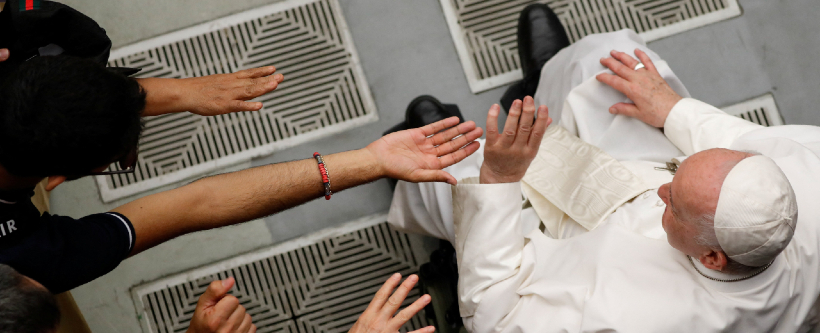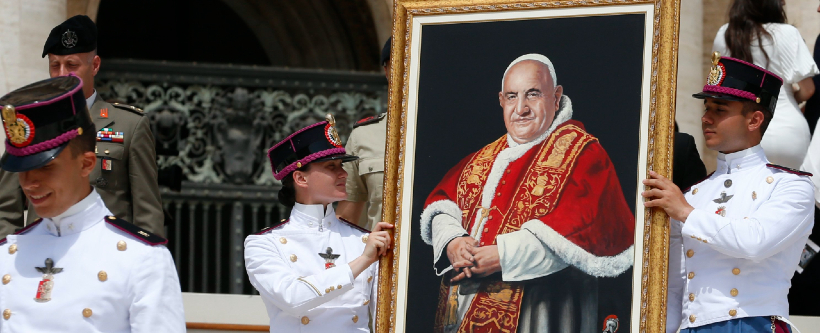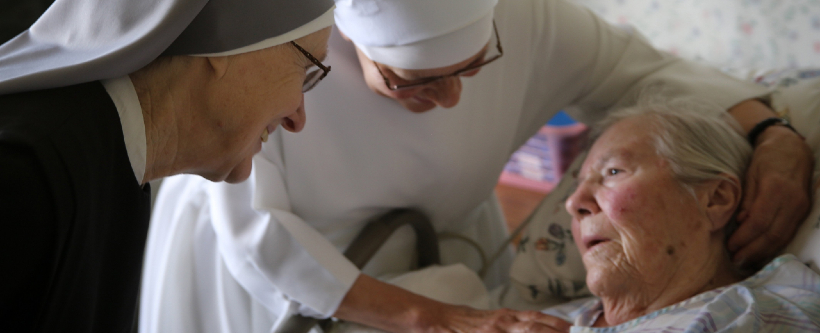
Today’s catechesis will serve as a doorway to a series of reflections on family life and what it’s really like to live in a family, day in and day out. Imagine three expressions written above the doorway; expressions I’ve already mentioned here in St Peter’s Square several times before. The expressions are: “may I?”, “thank you”, and “pardon me”. Indeed, these expressions open up the way to living well in your family, to living in peace. They are simple expressions, but not so simple to put into practice! They hold much power: the power to keep home life intact even when tested with a thousand problems. But if they are absent, little holes can start to crack open and the whole thing may even collapse.
We usually include these expressions under the general category of being “well-mannered”. Okay, a well-mannered person asks permission, says thanks, and asks forgiveness after making a mistake. Very well. But good manners really are that important. A great Bishop, Francis de Sales, used to say that “good manners are are already half the way to holiness”. But be careful: history has shown that good manners also can become a kind of formalism that masks a dryness of soul and indifference toward the other person. It is often said, “behind a lot of good manners lurk a lot of bad habits”. Not even religion is immune from the risk of having formal observance sink into spiritual worldliness. The Devil, tempting Jesus, boasts of good manners. Indeed, he presents himself as a gentleman, a knight in shining armor. He even presents himself as a theologian by quoting Holy Scripture. He appears to have everything right and neat on the outside, but his intent is always to lead others astray from the truth of God’s love. We, however, mean “good manners” only in the most authentic way, according to which the habit of cultivating good relations is firmly rooted in a love for the good and a respect for the other person. The family lives according to this refined sense of loving.
Let’s look at these expressions: the first expression is, “may I?” When we take care to ask for something kindly — even something we think we have a rightful claim to — we help to strengthen the common life that undergirds marriage and the family. Entering into the life of another, even when that person already has a part to play in our life, demands the sensitivity of a non-invasive attitude which renews trust and respect. Indeed, the deeper and more intimate love is, the more it calls for respect for the other’s freedom and the ability to wait until the other open’s the door to his or her heart. At this point, we can remember the words of Jesus in the Book of Revelation: “Behold, I stand at the door and knock; if any one hears my voice and opens the door, I will come in to him and eat with him, and he with me” (3:20). Even the Lord asks permission to enter! Let us not forget that. Before doing anything in your family, ask: “Do you mind if I do this? Would you like me to do this?” This way of asking is well-mannered indeed, but it is also full of love. This does so much good for families.
The second expression is “thank you”. Sometimes we have to wonder if we are turning into a civilization of bad manners and bad words, as if this were a sign of self-liberation. It’s not uncommon to hear these bad words publicly. Kindness and the ability to say “thank you” are often considered a sign of weakness and raise the suspicion of others. This tendency is encountered even within the nucleus of the family. We must become firmly determined to educate others to be grateful and appreciative: the dignity of the person and social justice must both pass through the portal of the family. If family life neglects this style of living, social life will also reject it. Gratitude, however, stands at the very core of the faith of the believer. A Christian who does not know how to thank has lost the very “language” of God. This is terrible! Let’s not forget Jesus’ question after he heals the ten lepers and only one of them returns to thank him (Luke 17:18). I remember once listening to a very wise, old person; very simple, but with that uncommon wisdom of life and piety: “Gratitude is a plant that grows only in the soil of noble souls”. That nobility of soul, that grace of God in the soul compels us to say “thank you” with gratitude. It is the flower of a noble soul. This really is something beautiful.
The third expression is “pardon me”. Granted, it’s not always easy to say, but it is so necessary. Whenever it is lacking, the little cracks begin to open up — even when we don’t want them to — and they can even become enormous sinkholes. It’s hardly insignificant that in the “Our Father” that Jesus teaches us — a prayer that sums up all of life’s essential questions — we find this expression: “Forgive us our trespasses, as we forgive those who trespass against us” (Matt 6:16). To acknowledge that we have fallen short, to be desirous of returning that which has been taken away — respect, sincerity, love — these make us worthy of pardon. This is how we heal the infection. If we are not able to forgive ourselves, then we are no longer able to forgive period. A house in which the words “I’m sorry” are never uttered begins to lack air, and the flood waters begin to choke those who live inside. So many wounds, so many scrapes and bruises are the result of a lack of these precious words: “I am sorry”. Marital life is so often torn apart by fights … the “plates will even start flying”, but let me give you a word of advice: never finish the day without making peace with one another. Listen to me carefully: did you fight with your wife or husband? Kids — did you fight with your parents? Did you seriously argue? That’s not a good thing, but it’s not really that which is the problem: the problem arises only if this feeling hangs over into the next day. So if you’ve fought, do not let the day end without making peace with your family. And how am I going to make peace? By getting down on my knees? No! Just by a small gesture, a little something, and harmony within your family will be restored. Just a little caress, no words necessary. But don’t let the sun go down on your family without having made your peace. Do you understand me? It’s not easy, but you have to do it. It will help to make life so much more beautiful.
So these three key expressions for family life are really simple words; so simple that perhaps they even bring a smile to our face. But when we forget them, it’s no laughing matter, right? Perhaps we overlook our good manners too often. May the Lord help us to put them back where they belong: in our hearts, in our homes, and in our civic life. These are the words that truly enter into the love of a family.
Special greetings:
I offer an affectionate greeting to all the English-speaking pilgrims and visitors present at today’s Audience, including those from England, Sweden, Taiwan, Cameroon and the United States. May Jesus Christ strengthen you and your families in faith, so that you may be a sign to the world of his love and mercy. May God bless you all!
I address a special thought to young people, to the sick and to newlyweds. Today is the liturgical memory of the Blessed Virgin of Fatima. Dear young people, learn to cultivate a devotion to the Mother of God with the daily recitation of the Rosary; dear sick people, feel Mary present at the hour of the Cross and you, dear newlyweds, pray to her that love and mutual respect never be lacking in your home.






Facebook Comments